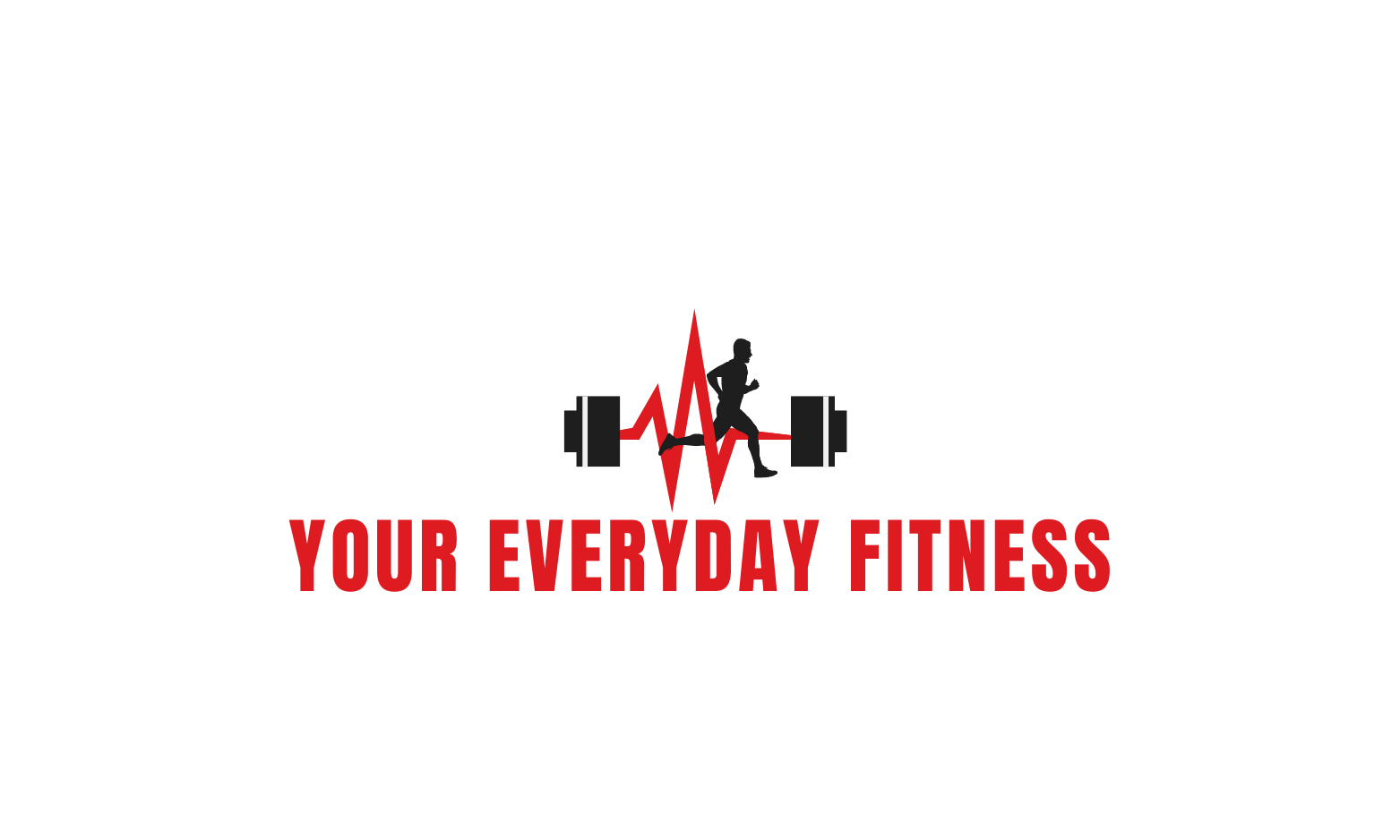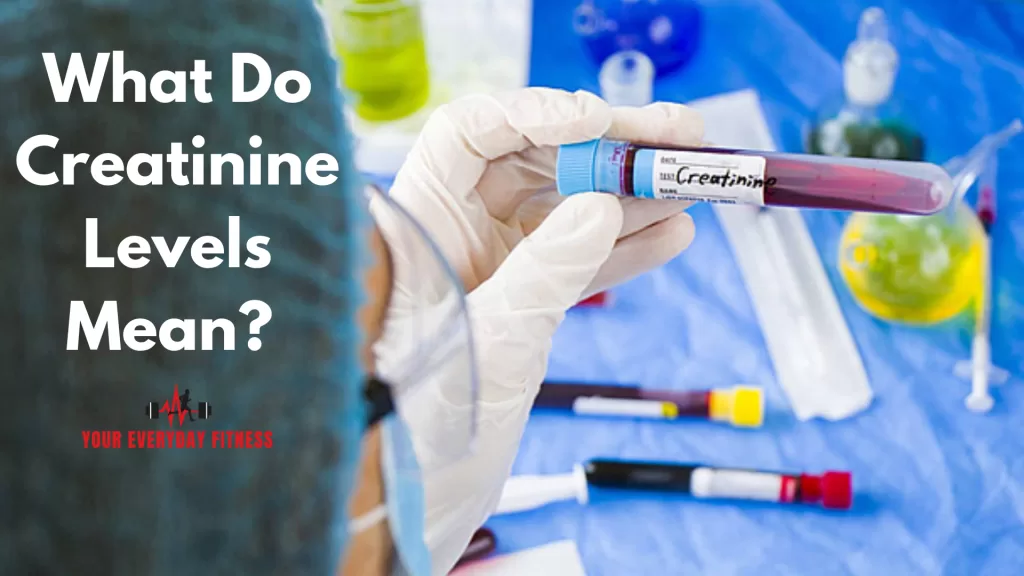Introduction
If you’ve ever gone to the doctor, gotten a blood test and seen creatinine levels, you may have wondered—what do creatinine levels mean? Are high levels good or bad? What are the normal levels? Should I know more about this? This is pretty normal, as creatinine is something that isn’t discussed as much as it should be.
In this article, we will go over everything related to creatinine levels. What creatinine is, what normal levels for creatinine are, what it means if the levels are high, if they’re low, and how you can manage your own creatinine levels.
By the end of this guide, you’ll have a much better understanding of how creatinine, and how it relates to your kidney health and overall well-being.
What Is Creatinine?
Creatinine is a byproduct of creatine, a compound your muscles use for energy. I’m sure you have heard of creatine before, especially if you are someone who works out a lot and is interested in supplementation.
Anyways, every time your muscles contract, they produce a little bit of creatinine as a waste product. Your blood takes this creatinine to your kidneys and your kidneys filter them out through urine.
That being said, creatinine is more than just a kidney function marker—it also reflects muscle mass, metabolism, and even bone health (Huh et al., 2015). Understanding your creatinine levels can give you insights into multiple aspects of your health, not just kidney function.
Because creatinine is produced by muscles, individuals with higher muscle mass naturally have higher creatinine levels. In fact, studies have shown that serum creatinine can serve as a proxy for muscle mass (Harita et al., 2009).
This means that lower creatinine levels might indicate reduced muscle mass, which can affect overall metabolic health.
That’s why a bodybuilder and a petite elderly woman will likely have very different “normal” creatinine levels.
Normal Creatinine Levels

Normal creatinine levels vary based on factors like age, gender, muscle mass, and overall health.
Here’s a general guideline for blood creatinine levels:
- Men: 0.7 to 1.3 mg/dL
- Women: 0.6 to 1.1 mg/dL
- Children: 0.3 to 0.7 mg/dL
However, like we just mentioned, what’s “normal” for one person might not be for another.
Normal creatinine levels vary not only by age and gender but also by ethnicity. A large study from the National Health and Nutrition Examination Survey (NHANES III) found that creatinine levels tend to be highest in non-Hispanic Black individuals, followed by non-Hispanic Whites, and lowest in Mexican-Americans (Jones et al., 1998).
This may sound surprising, but it does suggest that genetic and lifestyle factors may also play a role in determining normal creatinine levels.
High Creatinine Levels: What Do They Mean?
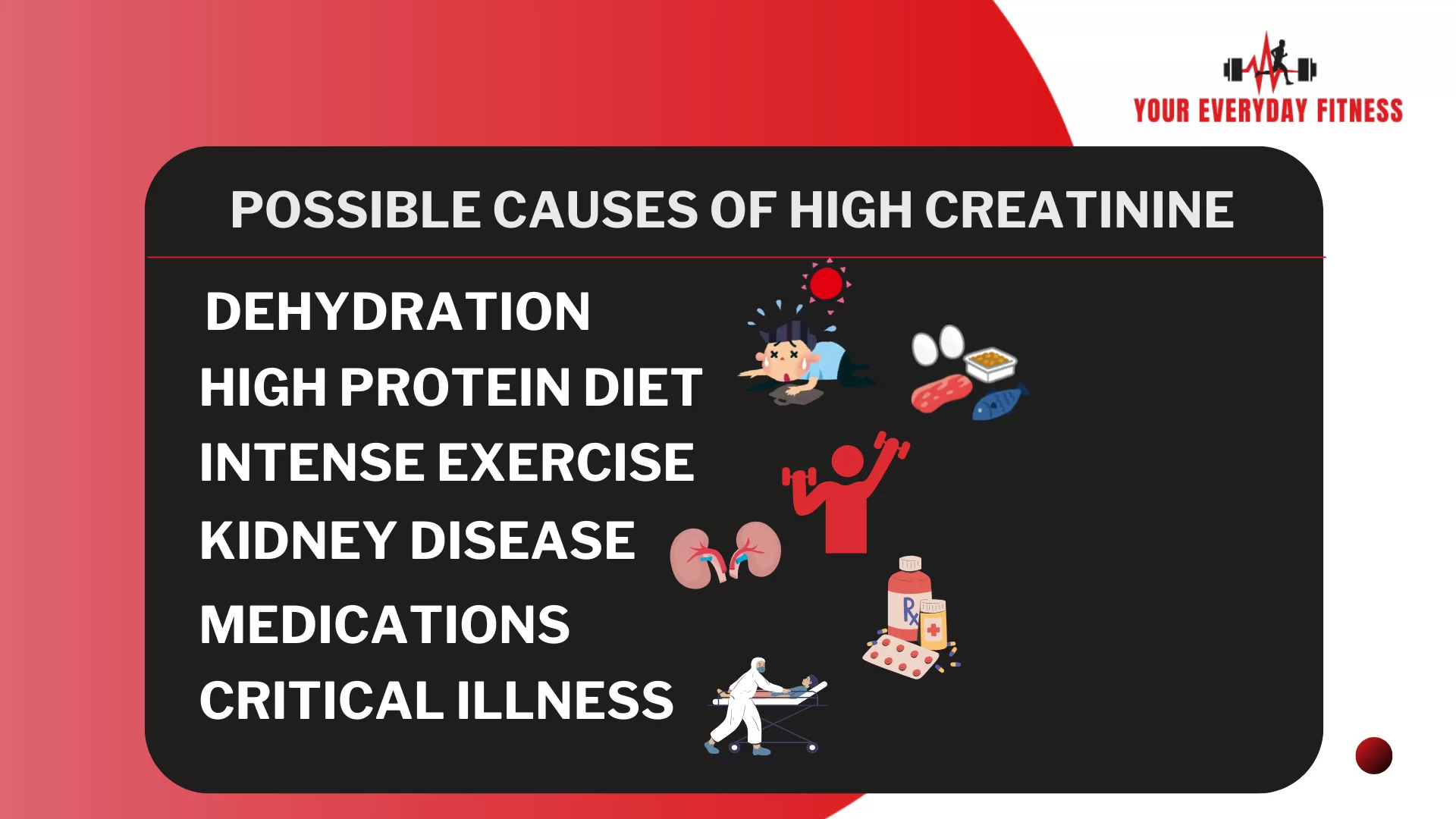
Put simply, high creatinine levels might mean your kidneys aren’t filtering this waste properly.
But before you run around completely panicking because you have creatinine levels that are high, let’s look at some of the common reasons why creatinine might be elevated:
Possible Causes of High Creatinine
- Dehydration – Not drinking enough water can temporarily increase creatinine levels.
- High Protein Intake – Eating a lot of red meat or protein supplements can spike levels.
- Intense Exercise – Heavy workouts break down more muscle, temporarily raising creatinine.
- Kidney Disease – Studies have shown that chronic kidney disease (CKD) and acute kidney injury can both raise creatinine levels, but CKD often progresses silently over time (Shahbaz et al., 2024).
- Medications – Some drugs, like NSAIDs and antibiotics, can inhibit kidney function and cause false elevations in creatinine without true kidney damage (Shahbaz et al., 2024).
- Critical Illness – In intensive care settings, creatinine spikes are associated with higher mortality rates, highlighting its role as a key marker of serious health conditions (Ostermann et al., 2016).
What Happens If Creatinine Is Too High?
High levels of creatinine could indicate some serious health risks, or it could indicate that you need to change your lifestyle.
A slight increase in creatinine could signal a potential health risk. A study from the Framingham Heart Study found that elevated creatinine levels were associated with older age, hypertension, and diabetes—all risk factors for kidney disease (Culleton et al., 1999).
Additionally, research has shown that a rise in creatinine of just 0.2 mg/dL significantly increases the risk of developing end-stage renal disease (Iseki et al., 1997).
If creatinine is only slightly high, lifestyle changes, like drinking more water, or eating less red meat, might bring it back to normal.
That being said, if your levels are significantly elevated, it could indicate a kidney problem that needs medical attention. Make sure to check with your doctor if this is a concern.
Low Creatinine Levels: Should You Be Concerned?
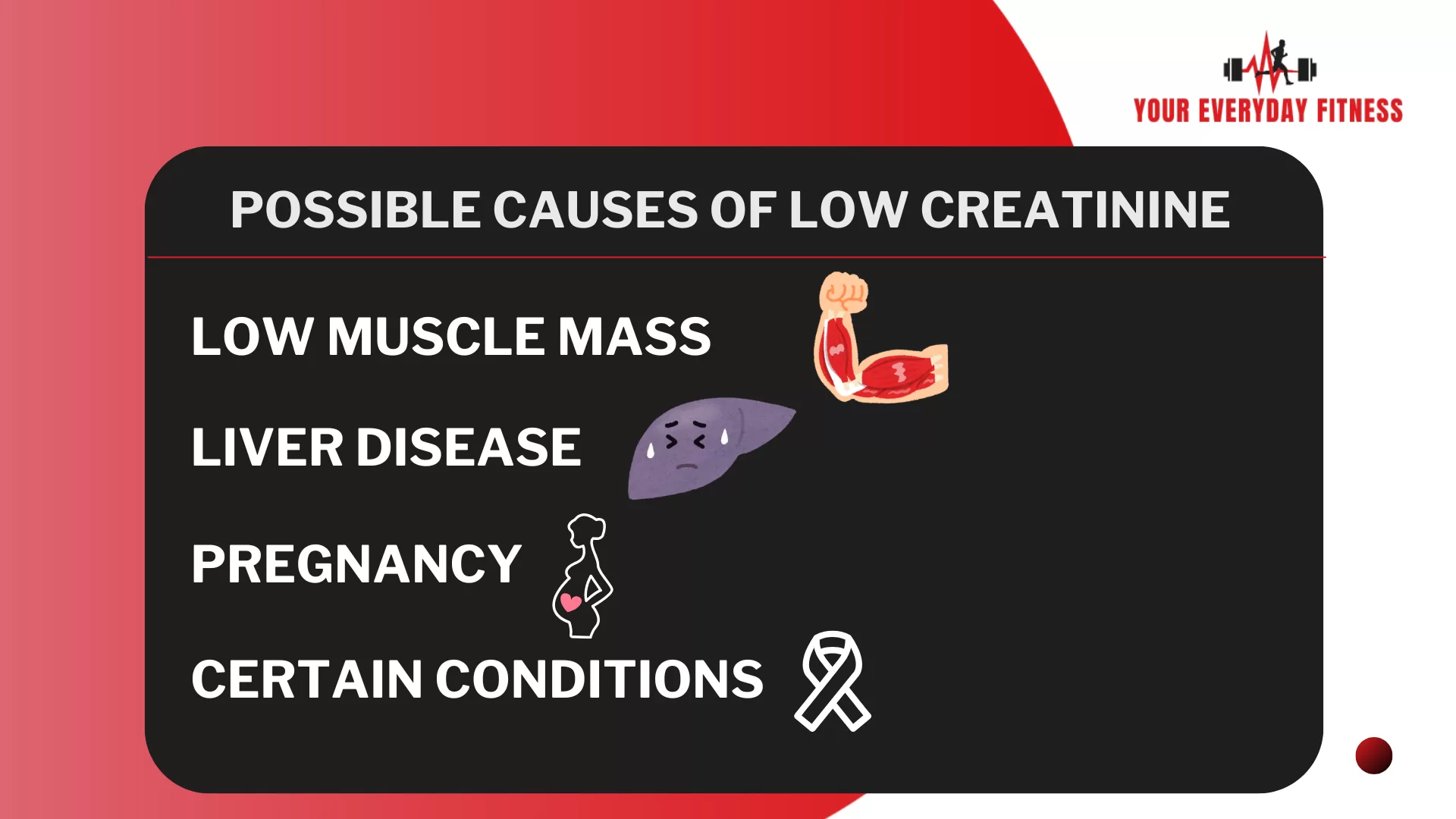
Low creatinine levels, while less common, can still indicate some health issues.
Since creatinine comes from muscle activity, low levels are often linked to muscle loss or certain medical conditions.
Low creatinine is not just a random lab value—it can indicate muscle atrophy, metabolic disorders, or even poor bone health.
Possible Causes of Low Creatinine
- Low Muscle Mass – Aging, malnutrition, or muscle-wasting diseases (like muscular dystrophy) can lead to lower levels.
- Liver Disease – Since creatinine is produced in the liver, liver dysfunction can cause low levels.
- Pregnancy – Increased fluid volume in the body during pregnancy can dilute creatinine levels.
- Certain Conditions – Chronic illnesses that cause severe weight loss (like cancer or autoimmune diseases) can lower creatinine.
What Happens If Creatinine Is Too Low?
Low creatinine isn’t usually a big problem on its own, but it might hint at an underlying issue that needs attention, like muscle loss or a chronic condition.
Low creatinine could be a sign of hidden health risks. If levels are persistently low, it may indicate sarcopenia (age-related muscle loss), higher diabetes risk, or even weakened bones prone to fractures (Huh et al., 2015; Harita et al., 2009).
A major Japanese cohort study (Kansai Healthcare Study) also found that lower creatinine levels were linked to an increased risk of type 2 diabetes (Harita et al., 2009). This suggests that low muscle mass might contribute to insulin resistance and metabolic dysfunction.
A study using data from the Korean National Health and Nutrition Examination Survey (KNHANES) found that low creatinine levels were strongly linked to decreased bone mineral density (BMD), especially in older men and postmenopausal women (Huh et al., 2015). This means that creatinine levels might be a useful marker for both muscle and bone health.
Low creatinine levels could also be related to severe malnutrition or dieting. Not enough protein will reduce your muscle mass and lower your creatinine production.
It can also be caused by drinking too much water. While you may not think of overhydration as much as you do dehydration, overhydration can dilute blood, which may artificially lower creatinine levels.
How Is Creatinine Tested?
Doctors measure creatinine levels through blood tests or urine tests. These tests will help you and your doctor know how well your kidney is functioning, and your overall health levels.
Types of Creatinine Tests
- Serum Creatinine Test – A simple blood test that measures creatinine levels.
- Creatinine Clearance Test – A 24-hour urine collection to check how much creatinine is being filtered by the kidneys.
- Estimated GFR (eGFR) – A calculation using creatinine levels to estimate kidney function.
If test results show abnormal creatinine levels, doctors may run additional tests to determine the cause.
Interpreting Test Results
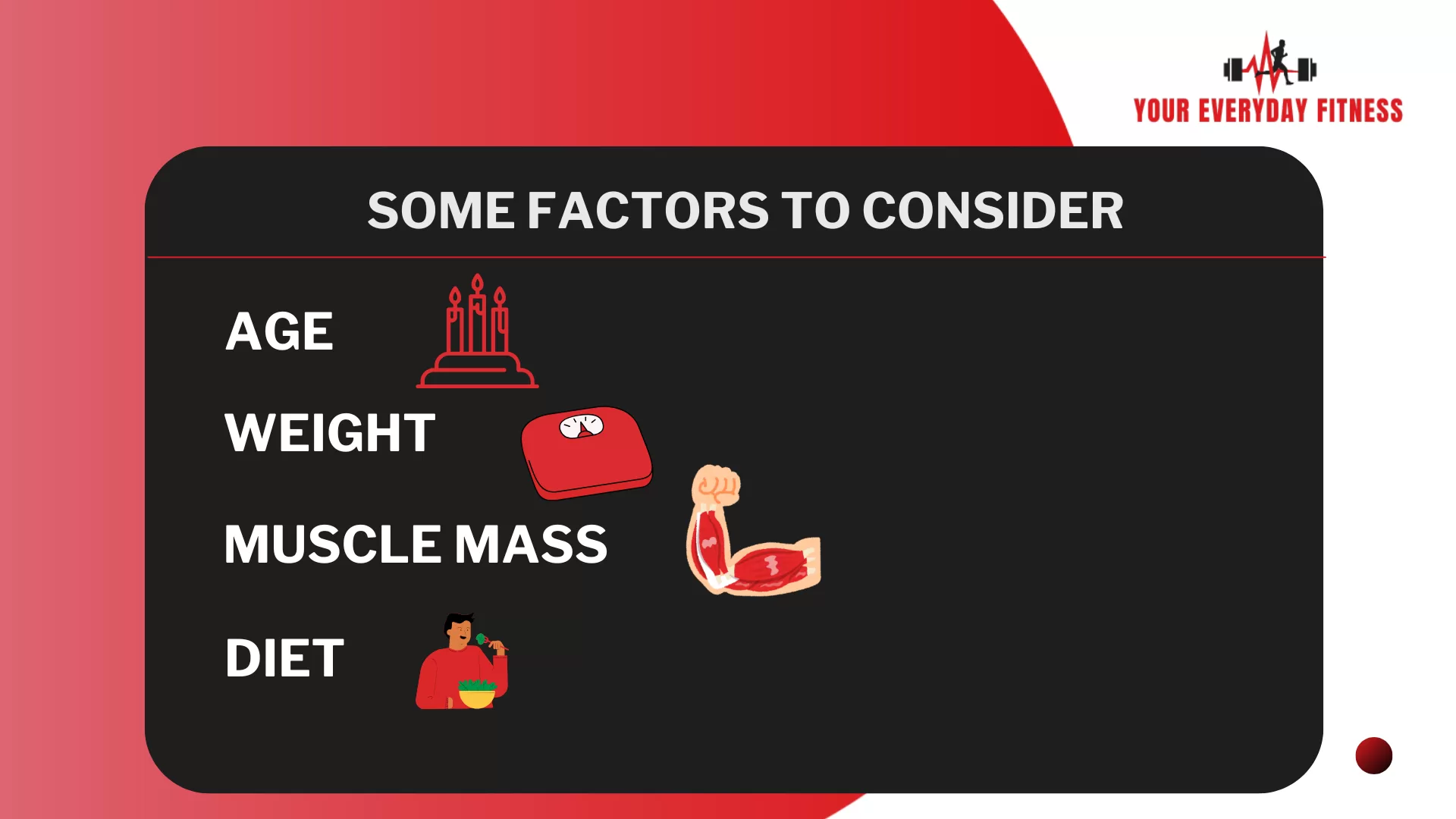
Determining what your test results mean is not just about looking at the numbers. You need to consider multiple factors and look at the bigger picture.
When analyzing these tests, doctors will consider:
Your age, weight, and muscle mass – A young athlete and an older adult will have different normal ranges.
Your diet and hydration levels – Recent meals and water intake can affect creatinine levels.
Your medications – Drugs can impact kidney function and creatinine production.
Your kidney function (GFR) – A low GFR combined with high creatinine suggests kidney disease.
Creatinine levels alone are not a perfect indicator of kidney health. Studies suggest that creatinine levels alone may overestimate or underestimate kidney function, especially in patients with low muscle mass, dehydration, or altered protein metabolism (Shahbaz et al., 2024).
This is why doctors use eGFR (estimated glomerular filtration rate) in combination with creatinine to get a clearer picture of kidney function.
How to Manage Abnormal Creatinine Levels
If your creatinine levels are too high or too low, there is no need to panic right away, because you can do a lot of different things to get them back under control.
Tips for Lowering High Creatinine Levels
Stay Hydrated – A study on creatinine clearance confirmed that dehydration can cause temporary spikes in creatinine levels (Shahbaz et al., 2024). Many health studies suggest about 2 liters, or half a gallon per day. Paying attention to your urine color is a good indication of hydration.
Adjust Your Diet – Reducing red meat intake can lower creatinine as creatinine is a byproduct of muscle breakdown, and excess protein can stress the kidneys (Culleton et al., 1999).
Check Medications – Certain medications like trimethoprim–sulfamethoxazole can falsely elevate creatinine by 15-22% (Shahbaz et al., 2024). Make sure to check with your doctor with any concerns on your medications.
Tips for Increasing Low Creatinine Levels
Build Muscle – Resistance training has been shown to increase serum creatinine levels by boosting muscle mass (Harita et al., 2009).
Eat Enough Protein – A study on extraordinarily high creatinine levels found that nutritional status plays a major role in maintaining stable creatinine levels (Asif et al., 2020). If you don’t eat enough protein and notice low creatinine levels, this could be why.
Treat Underlying Conditions – If diabetes or chronic illness is contributing to low creatinine, addressing the root cause is key (Harita et al., 2009).
Final Thoughts
Creatinine levels can tell you a lot about your kidney health, but they don’t give the full picture on their own.
Just because your creatinine levels are high or low, does not mean you need to panic. The most important thing is understanding what’s normal for you and working with your doctor regularly to keep your kidneys healthy.
If your test results show unusual creatinine levels, don’t jump to conclusions—stay informed, ask questions, and focus on making healthy lifestyle choices.
References
- Shahbaz H, Rout P, Gupta M. Creatinine Clearance. [Updated 2024 Jul 27]. In: StatPearls [Internet]. Treasure Island (FL): StatPearls Publishing; 2025 Jan-. Available from: https://www.ncbi.nlm.nih.gov/books/NBK544228/
- Jones CA, McQuillan GM, Kusek JW, Eberhardt MS, Herman WH, Coresh J, Salive M, Jones CP, Agodoa LY. Serum creatinine levels in the US population: third National Health and Nutrition Examination Survey. Am J Kidney Dis. 1998 Dec;32(6):992-9. doi: 10.1016/s0272-6386(98)70074-5. Erratum in: Am J Kidney Dis 2000 Jan;35(1):178. PMID: 9856515.
- Ostermann M, Kashani K, Forni LG. The two sides of creatinine: both as bad as each other? J Thorac Dis. 2016 Jul;8(7):E628-30. doi: 10.21037/jtd.2016.05.36. PMID: 27501529; PMCID: PMC4958791.
- Asif AA, Hussain H, Chatterjee T. Extraordinary Creatinine Level: A Case Report. Cureus. 2020 Jul 8;12(7):e9076. doi: 10.7759/cureus.9076. PMID: 32670725; PMCID: PMC7357312.
- Culleton BF, Larson MG, Evans JC, Wilson PW, Barrett BJ, Parfrey PS, Levy D. Prevalence and correlates of elevated serum creatinine levels: the Framingham Heart Study. Arch Intern Med. 1999 Aug 9-23;159(15):1785-90. doi: 10.1001/archinte.159.15.1785. PMID: 10448783.
- Harita N, Hayashi T, Sato KK, Nakamura Y, Yoneda T, Endo G, Kambe H. Lower serum creatinine is a new risk factor of type 2 diabetes: the Kansai healthcare study. Diabetes Care. 2009 Mar;32(3):424-6. doi: 10.2337/dc08-1265. Epub 2008 Dec 15. PMID: 19074997; PMCID: PMC2646021.
- Huh JH, Choi SI, Lim JS, Chung CH, Shin JY, Lee MY. Lower Serum Creatinine Is Associated with Low Bone Mineral Density in Subjects without Overt Nephropathy. PLoS One. 2015 Jul 24;10(7):e0133062. doi: 10.1371/journal.pone.0133062. PMID: 26207750; PMCID: PMC4514793.
